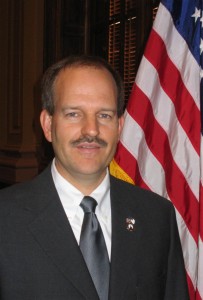
By Sen. Chip Pearson
ATLANTA (March 5, 2010) – To cope with a sluggish economy and plummeting revenues, Georgia’s state government needs a major lifestyle change. We’re putting our budget on a lean diet of essential spending by concentrating funding in the vital areas of government, such as education, public safety and transportation.
Every idea is on the table as to how we fill over a $1 billion hole in the state budget. We’ve reached the end of the legislature’s two-week working recess, in which Senate and House members came together in unprecedented joint budget hearings to work through the Fiscal Year 2011 budget. While meeting with every state agency to go over their 2011 budgets and suggested cuts, the common theme that emerged was consolidating services and identifying unnecessary government spending. We’re considering every tool in the toolbox to decide what cuts will be most effective and have the least impact on the state.
One of the hot button issues to come out of these meetings was the discussion of potential cuts to Georgia’s university system. After Chancellor Erroll Davis presented a budget with cuts totaling $265 million, lawmakers asked university officials to come back with an additional $300 million in cuts. Some have suggested that such cuts could result in increases to college tuition. Others fear that course offerings, programs and research services will have to be reduced. Because nearly 65 percent of our budget goes to education, some cuts will have to be made. The good news is that Georgia still has significantly lower tuition compared to other states within the Southern Regional Education Board; Florida has increased their tuition up to 15 percent. However, we have no intention of balancing the budget on the backs of our students. Everyone is being asked to share the burden, and it is important that the university system prioritize its spending cuts.
Another option that’s available to plug the budget gap is updating user fees. Many of these are outdated and were set as far back as 1967. We’ll look at adjusting fees across three dimensions: updating them to current levels by accounting for inflation, covering costs and keeping them in line with other southeastern states. When we start cutting the budget to the bone, it’s important to look at other areas of government that can supplement those reductions and allow us to continue funding essential services.
Again, these are simply options that are on the table. No final decisions have been made, and we are still awaiting February’s revenue numbers before setting anything in stone. Last year, February was the worst month on record for revenue collections. If February numbers slip again this year, we’re expecting the governor to revise his revenue estimate, which is another game-changer for the budget. The current budget we’re working on anticipates a 4 percent revenue growth, which may be too optimistic. This anticipated growth is set by the governor, who establishes the revenue estimate every year. By law, the legislature has to base the state budget off the governor’s revenue estimate. If revenues come in under that estimate, it’s the legislature’s job to go back and cut spending further.
The governor derives his estimate from projections by the state economist, who has said we can expect to see growth by the middle of this year. While this is positive news, that revenue growth is already spoken for by the increase in Georgia’s student population and rising health care costs. If Washington has its way, the growth in Medicaid rolls is sure to eat up a significant portion of additional revenue the state has to spare.
That is why conservative principles are so important in budgeting, and balancing a fiscally responsible budget is what Senate Republicans are committed to doing. This is one of the best ways to create an economic environment in Georgia that creates jobs and gets people back to work. In the coming weeks we’ll continue working to balance the budget, and I’ll continue fighting for those conservative principles that help make our state the economic engine of the South.
Sen. Chip Pearson serves as chairman of the Economic Development Committee. He represents the 51st Senate District which includes Dawson, Fannin, Gilmer, Lumpkin, Pickens, and Union counties and portions of Forsyth and White counties. He may be reached at 404.656.9221 or via e-mail at chip.pearson@senate.ga.gov.
COLUMN
For Immediate Release:
March 5, 2010
For Information Contact:
Raegan Weber, Director
Kallarin Richards, Senior Communications Specialist
kallarin.richards@senate.ga.gov
404.656.0028